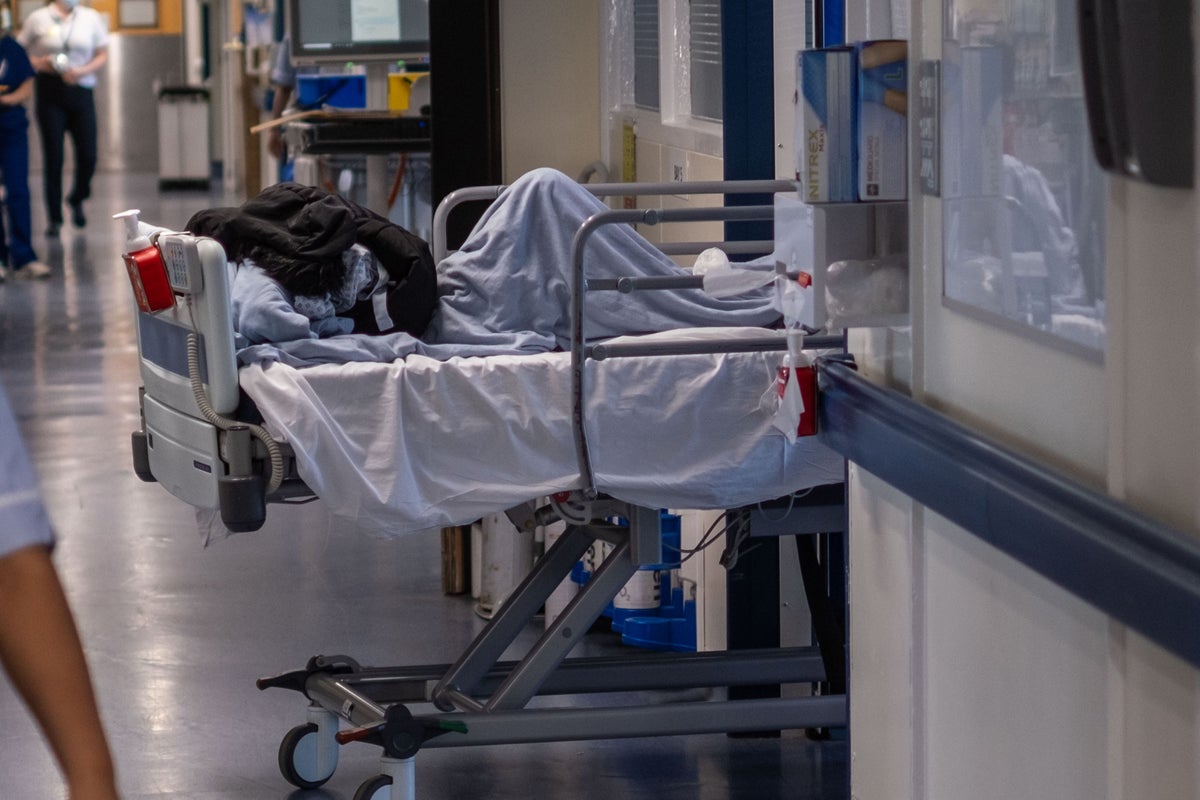
Almost three in five doctors cared for patients in temporary spaces like hospital corridors, offices and cupboards this summer, according to a new survey.
The poll suggests corridor care “has sadly become an everyday reality” for medics and is not confined to winter, according to the Royal College of Physicians (RCP).
Some doctors said they had even considered retiring early due to the issue.
The RCP snapshot survey of 553 doctors found 59% had reported caring for patients in temporary spaces between June and August.
Of the 328 medics who said they had delivered so-called corridor care, 72% said they had felt forced to do so.
Some 45% said this happened daily or almost daily, and two thirds (66%) reported feeling this was “the new norm”.
More than nine in 10 (94%) told the poll patient privacy and dignity had been compromised, while 84% said they felt patient confidentiality was at risk.
Meanwhile, 8% of doctors said they had considered leaving their role due to the experience.
Dr Hilary Williams, RCP clinical vice president, said: “Delivering care in corridors and other temporary spaces has sadly become an everyday reality for many doctors, placing immense physical and emotional strain on staff.
“Patients deserve better. They should receive care in safe, private, and properly equipped environments.
“Lasting change requires urgent systemic action. Strengthening social care, improving patient flow, and expanding alternatives to hospital admission within the community, such as hospital-at-home programmes, are essential.”
One medic described treating patients – one of whom had a brain abscess – in front of a vending machine as “a new low”.
Another told the RCP survey they have considered early retirement because of corridor care.
Doctors also issued a warning ahead of the colder months, saying: “Extra patients on the ward in areas not equipped for looking after patients has become normal. This is summer, it can only get worse over winter.”
Dr Zuzanna Sawicka, RCP clinical director for patient safety and clinical standards, said: “No doctor should be delivering care next to a vending machine, yet this is what our members have told us.
“Our survey findings show corridor care has become the reality for too many. This is not the standard of care doctors are trained to deliver, nor is it the standard patients deserve.
“The RCP will keep pressing the Government and NHS to eliminate corridor care. But while this unacceptable practice continues, our guidance aims to support clinicians and providers to deliver safe care in these unsafe conditions. This is a response to reality – not a sign of approval.”
The RCP has reiterated calls to the NHS and UK Government to prevent corridor care by implementing systems that improve patient flow and hospital discharge, as well as pledging long-term investment in social care to tackle avoidable hospital admissions.
Sam Mauger, chair of the RCP Patient and Carer Network, warned that corridor care “is a symptom of deeper problems – chronic underinvestment, lack of capacity, and slow progress on social care reform”.
“Patients want solutions, not excuses. We hope the RCP’s call for urgent action to end this unsafe practice is heard, so we can ensure that every patient, in every season, receives care in an appropriate clinical environment.”
Rory Deighton, acute and community care director at the NHS Confederation, said the RCP’s findings paint “a deeply worrying picture of the use of corridor care and its impact on staff”.
“Corridor care has often been used as a last resort in winter to increase hospital capacity in the face of surging demand.
“But with the most recent data showing that the health service has been seeing incredibly high demand over the summer months as well, it is unfortunately not surprising to hear that NHS staff have been left with little choice but to use temporary areas to treat patients.
“There is no easy fix, but the NHS and partners are working incredibly hard to bolster community support to care for people closer to home and reduce demand on hospitals. The lack of suitable infrastructure for surge capacity is a challenge for some hospitals, which is why we’ve been urging the government to allow private capital investment into more parts of the NHS – including the acute sector – in order to build new facilities.”
A Department of Health and Social Care spokesperson said: “It is shocking corridor care has become a feature of the NHS and we are working at pace to turn around more than a decade of neglect.
“Despite NHS Accident and Emergency departments facing their busiest August ever, ambulance response times and handovers are the fastest they have been since the pandemic.
“To prepare our health service this winter we are expanding urgent and emergency capacity and upgrading hundreds of ambulances across the country – backed by an extra £450 million. We are also ensuring vulnerable people are protected from Covid and flu through our vaccine programme – and we are working with NHS leaders this winter to implement robust plans for their patients.”
